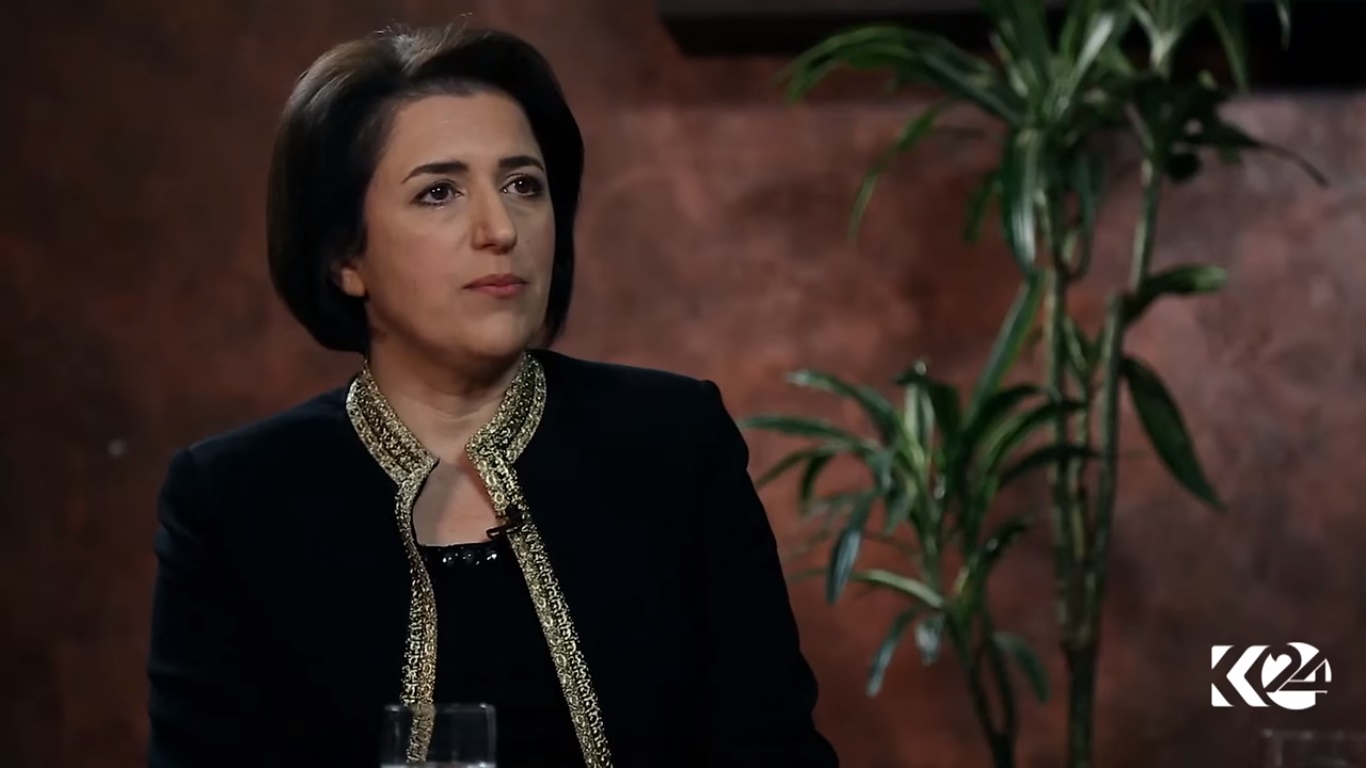Independence not a gift

ERBIL, Kurdistan Region (K24) – In an exclusive interview with K24 on December 19, Bayan Sami Abdul-Rahman, the Kurdistan Regional Government Representative (KRG) in Washington, said, “Our [Kurdistan Region’s] relations with the United States have now reached a high level.”
Ms. Abdul Rahman’s key role as Representative in Washington, DC, is to strengthen the relationship between the Kurdistan Region and the United States, according to the Kurdistan Regional Government’s (KRG) official website. Prior to Representing the KRG in Washington, DC, she was the High Representative of the Kurdistan Region in the United Kingdom. Before starting her political career, she worked for several newspapers in London, including the Observer and Financial Times, and was the Times Tokyo correspondent.
In the interview, Ms. Abdul Rahman expressed that, “the US supports Kurds and Kurdistan.” and referred to the two trips U.S. Defense Secretary Ash Carter took to the Kurdistan Region earlier this year, noting these are signs of closer relations between the KRG and the US.
On his first visit, Carter arrived on an unannounced visit to Erbil on July 24 to meet with KRG President, Massoud Barzani. His second visit was earlier this month, on December 17, as the current Obama administration agreed to directly arm two Peshmerga brigades. Ms. Abdul Rahman offered, “Carter told President Barzani several times [in his second visit to Kurdistan Region] that the US supports Kurdistan."
Ms. Abdul Rahman touched on Kurdish independence and the United States’ policy towards the unity of Iraq. She told K24, "The US sees the Kurdistan Region as an autonomous region, not a country, and President Obama and his administration want Iraq unified." she continued, "But at the same time, they [the US] are aware of our ultimate goal of independence.”
She continued, "...the US...and other countries now understood why Kurds need to be independent." Kurdistan and Iraq have been in the Western news media since 2003, and many Western countries have opened consulates in our Region. "We are fighting IS. This [fight] makes the Kurds known to the world." Ms. Abdul Rahman said.
She emphasized, "no one will give us independence [as] a gift." She added, "We have to show we can govern" and "we can protect the refugees" and so far "we have done that."
She pointed out however, that "at the beginning of the war against the Islamic State (IS) the US and some other countries sent weapons to us directly," still the US government has hesitations in arming Peshmerga directly. The US still prefers to send arms through Baghdad in order to maintain Iraq's unity, she added. Ms. Abdul Rahman elaborated and said, "The US government is aware of the hurdles Baghdad makes in sending firearms to Peshmerga." but "they [the US] are concerned arming Peshmerga directly will weaken Iraq."
Ms. Abdul Rahman also elaborated on the content of President Barzani's visit to Washington last May, "The US Congress and government welcomed President Barzani very warmly," adding, "President Barzani's visit...was very significant. It made us [our relations] closer to the US." Regarding Kurdistan's independence, she stated that US President Obama said in his meeting with President Barzani that the fight against IS is now a higher priority. She mentioned that this view is shared by many US officials, think-tanks, and Senators that the initial focus should be concerning the "war against IS and what the Peshmerga need in this fight, [and also] refugees, and IDPs, the economic condition of Kurdistan Region, and independence."
She continued, "but some of them [American officials] are scared of independence," "because they believe the US has sacrificed a lot [for Iraq]." At the same time, "there are American politicians who support Kurdistan's independence" she specified.
Ms. Abdul Rahman stated, "The people of America like Kurds" and said that the popularity of Kurds and Peshmerga among the American people is one of the main reasons that the current Presidential candidates have recently included Kurds among their debates.
(Kovan Izzet as the interviewer contributed to this report)
